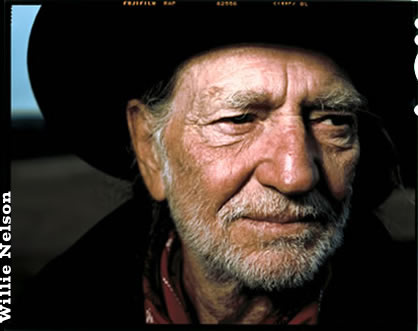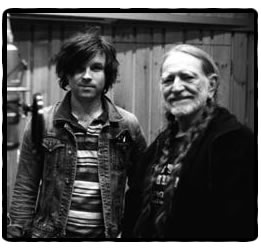
SONGBIRD • Willie Nelson
Perhaps it was inevitable that the Americana scene's ubiquitous young buck and its ageless highwayman would one day cross paths in the studio. Given the principals involved, two troubadours at opposite ends of the career path who tend to leave an indelible signature on everything they touch, Songbird merits attention most of all because producer Ryan Adams and artist Willie Nelson have created an aural document of estimablecreative tension and balance.

If Adams sets a provocative course that's decidedly to the left of Nelson's country-swing home turf, the 11-song set succeeds in roughly equal measure because the 73-year-old still exudes more than enough Texas dance hall mojo to firmly plant his flag on the album's often jagged landscape of distorted guitars and artfully disjointed arrangements.
As one might hope to discover at the sonic junction of tireless tweaking and tradition, connecting threads abound. But it's significant to note that standout tracks such as Gram Parsons' "$1,000 Wedding," Jerry Garcia & Robert Hunter's "Stella Blue," and a throbbing, minor-key take on "Amazing Grace" function not merely as handy reference points along the roots-music continuum, but rather as sturdy vehicles to showcase both Adams' restless urge to redefine and the ol' Redheaded Stranger's still potent ability to claim nearly any song as his own. What Nelson's well-weathered pipes have lost in expressive precision they've gained in sheer gravity. On less obvious cover choices such as Leonard Cohen's "Hallelujah" and the title track, a jangly reworking of the Christine McVie nugget originally released on Fleetwood Mac's mega-selling Rumours, the payoff is even sweeter.
That said, the best stuff on Songbird owes little to veteran/upstart creative tension or anybody's noble attempt to build bridges across a half-century of pop songcraft. It's Nelson's simply-rendered originals, four in all, that linger in mind the longest. The previously unreleased "Back to Earth" and "Sad Songs And Waltzes" hearken back to a time when Willie was pitching songs to Patsy Cline in pre-countrypolitan Nashville. "We Don't Run" rocks with a defiant spirit and underlying warmth that once authentically evoked the oft-abused phrase "outlaw country."
In other words, when the master got on a roll, Adams, to his enduring credit, had enough horse sense to get the hell out of the way. The Kid and the Old Man done good.
• Mike Thomas
 |
|
| listen to a clips | |
| return to covers | |
| buy it here or here | |
| willienelson.com | |
| ryan-adams.com | |
| lost highway | |
| puremusic home | |